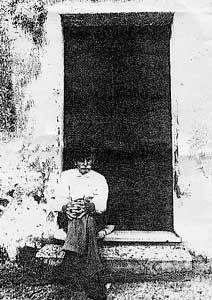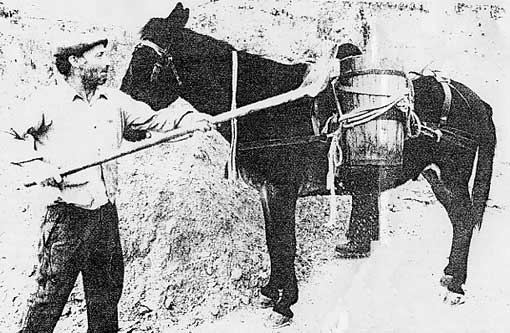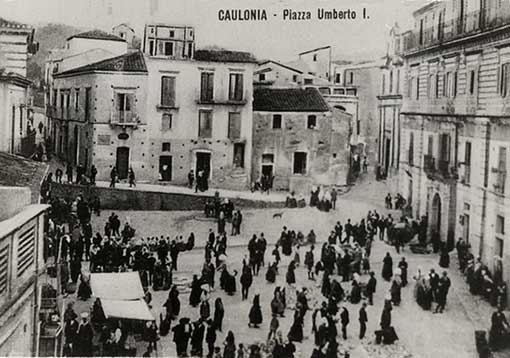 |
|
|
More
on the rebellion of
Caulonia: "my rebels"
We were very young, and literally fascinated, almost dazzled by that world full of intense humanity. That world had the effect on us of a great myth which completely swept us away. Whoever remembers the years in which we wrote the book, the seventies, will understand, thanks to direct experience or through personal documentation. In Caulonia back then, there was a tumultuous explosion of initiative and ideas; souls were alight with the hope of deep and radical change which was believed to be just round the corner; everyone wanted to bring at least one brick for the construction of the new world which we were dreaming of. It was in that climate of great moral, cultural and political tension that we felt the overpowering need to rediscover or reread the events of thirty years before which had been completely forgotten after being depicted in the most obscure colours for decades, as though they were a shameful part of our history, something which it was better not to speak of. The cultural climate of Caulonia, and not only, has changed yet again and, as a consequence, a revision of the facts in the old way is gaining popularity. As I write this remark, so as not to create confusion, I would like to express my greatest respect towards those who wrote “in the old style” making a concerted effort regarding their argumentation and documentation. The rebels of Caulonia who, on the morning of the 5th of March 1945 left their lairs at dawn, who crept down the steep mountainside under the first rays of the rising sun, were fired with great ideals of justice and liberation. And that, for me, is enough.
Today the hero farmers are no longer among us because the industrial and post-industrial civilisations have defeated them, destroying them, but they have left us a sublime message: to die most worthily while fighting strenuously to defend the values of their civilisation. Centuries of hard work and sacrifice had taught them to see beyond what others, blinded by their knowledge, had not been able to understand: the rapacious and arrogant dominant classes, remnants of the old landowners, were dying and by now in agony. In fact, within very little time from then the old landowners disappeared entirely from the historical scene. This was what the rebels of Caulonia had seen in 1945 when they tried to take up the flag of justice for the farmers of the south. It was, however, a dream, the illusion of a moment, because other more wealthy social classes, who were not then ready yet, would subsequently take control of the whole society. The heroes of Caulonia descended into the old feudal town and took control of it. The old managerial classes were left so numb at the sight of such audacity that they either handed themselves over to the rebels or they fled. On the other hand, there were those who behaved with dignity and composure. However it is never a question of single persons: the old ruling class, worn-out and undone within, had lost any form of moral and cultural supremacy: it merely exercised its tyrannical power over the whole society.
It was precisely because of the lack of initiative and outlets for their ambitions that the ruling class had closed itself in becoming more and more mean and evil. Those notable members who fled before the impetus of the “cafoni” (farmers) of Caulonia and the nearby farmhouses, returned, following the steps of an ancient and well experimented borbonist tradition, as soon as the police’ s bayonets appeared. Against the farmers of Caulonia, poorly armed and badly organised, the animal fury of hundreds and hundreds of well armed, well trained, equipped and above all, ferociously instigated and bravely led, strategically placed men crashed down, sent through the small lanes of ancient Caulonia by the wealthy class members who, in the meantime, had returned. In short, it was they who decided and wrote the lists of dangerous and innocent people. If ever there was a page of our history worthy of shame, this is the one: the cold-blooded, unpitying massacre of the farmer heroes who had not had the heart or the means to let the blood flow. If innocent blood was spilled during the days of the rebellion it was not a cold decision calculated by the rebels who had they let themselves be guided by vengeance would have shed a very different kind of blood than that of an innocent priest. The
Caulonian rebels first endured violence and then prison: hundreds of
years of imprisonment were inflicted upon them; but they left prison
with an untamed will to fight and became the protagonists of the great
struggle for bread, work and land which fired Caulonia in the following
years. Among
the rebels, and this is an undeniable fact, there was a strong will
for redemption and liberation during the beginning of the 1900s. The
meeting of minds between him and the “cafoni” was inevitable.
I have no difficulty in recognising that the movement was not the expression of one class which, for a host of reasons, could stand as a candidate to govern a State. What
I am unable to understand is the pretension to judge the Caulonian revolt
on the basis of the life, the juridical events and anything personal
to do with the life of Pasquale Cavallaro. If this were the right procedure,
the entire history of humanity would have to be rewritten. It would
mean that the historians should ask themselves what the criminal records
of the people who assaulted the Bastille in 1789, triggering the French
Revolution, were like. Or what the criminal records of those who assaulted
the Winter Palace were like, or even what those of the followers of
Mao on the long march were like. I
know that today my rebels of 1945 are no longer here. From then until
today many other things have happened. They were defeated like the Trojan
heroes who saw their houses burned down as they were dispersed throughout
the world, losing their cultural identity and even their pride in having
been the protagonists of a glorious fact. I believe this to be reason enough to immortalise the glorious actions of the 1945 heroes of Caulonia. |
|||||||
|
|
||||||||
 Copyright© 2000 Caulonia 2000 per continuare a cambiare - All rights reserved |
||||||||





